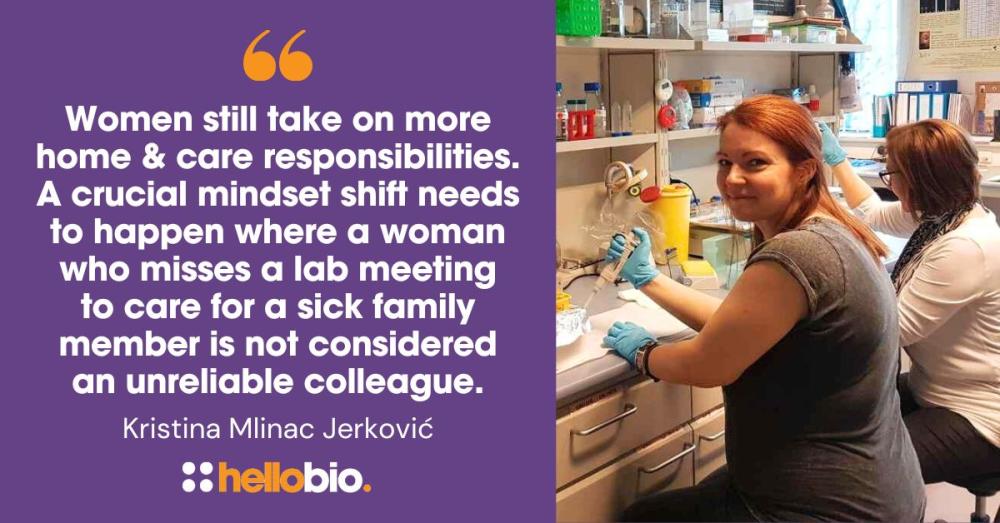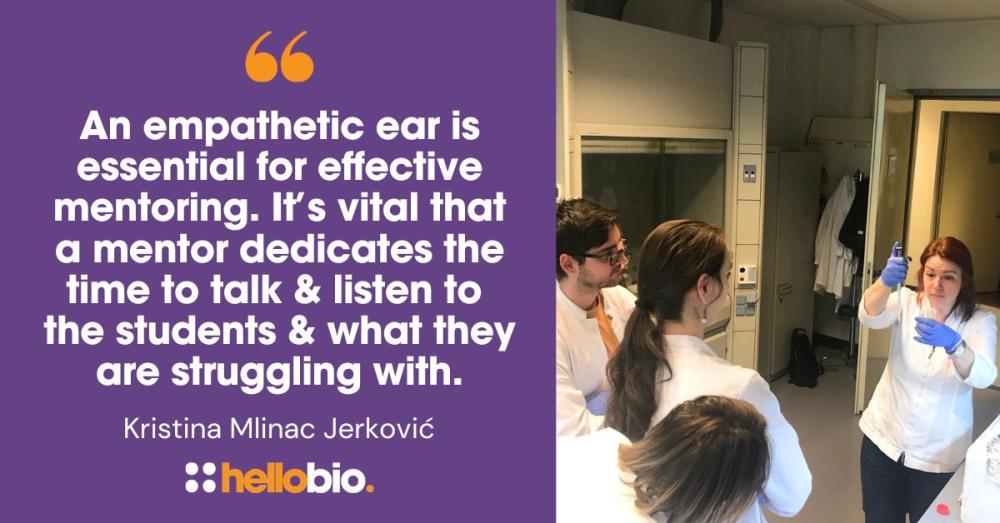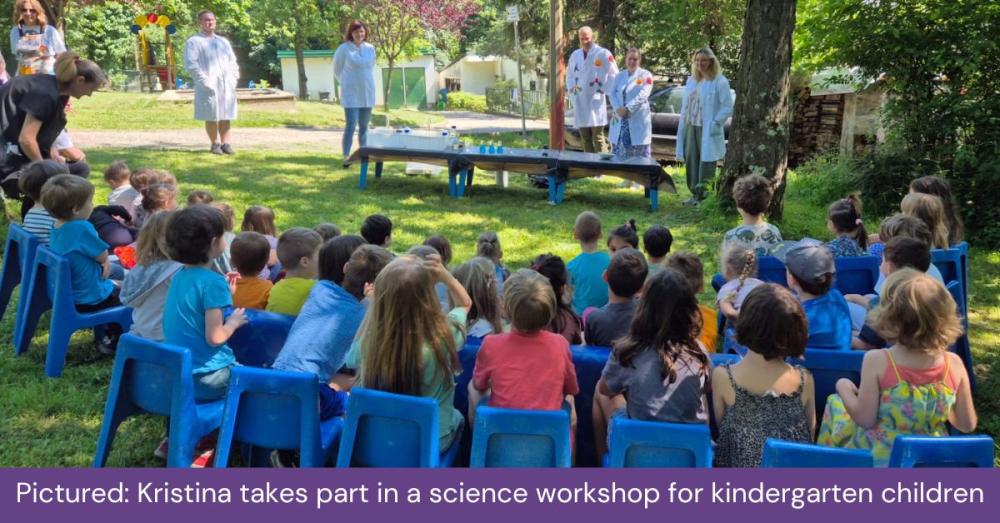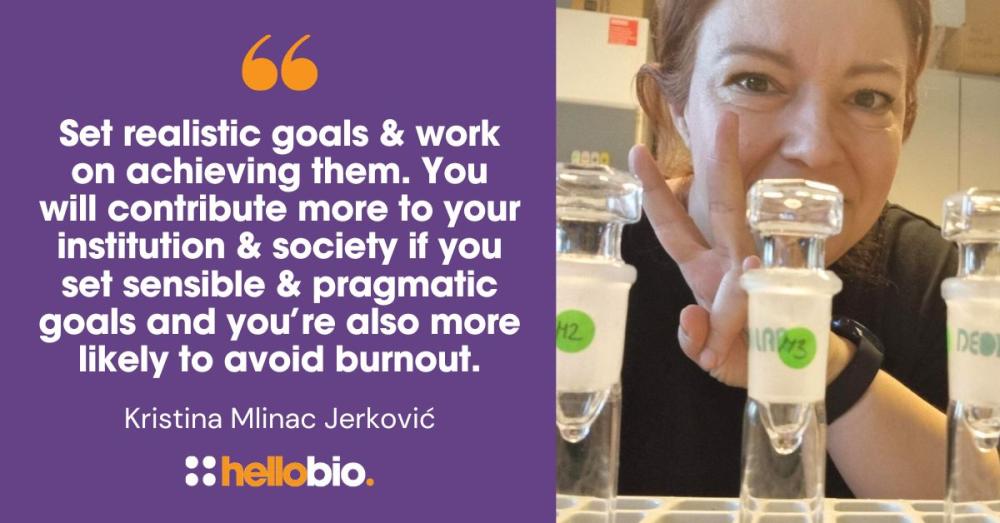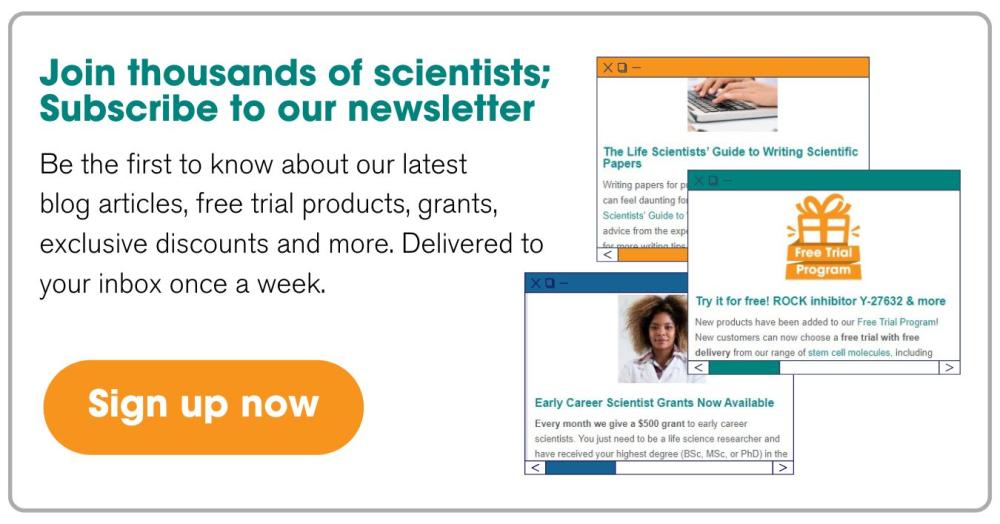Interviews with Scientists: Kristina Mlinac Jerković
In our regular Interviews with Scientists feature, we love chatting to life science researchers to learn more about their career paths, their achievements, and their fascinating research projects. This week we spoke to Kristina Mlinac Jerković, an Associate Professor at the University of Zagreb to find out more about her work as a teacher and researcher in Croatia.
Kristina Mlinac Jerković completed the integrated undergraduate and graduate programme in Molecular Biology in 2005 at the Department of Biology, Faculty of Science, University of Zagreb. In 2007 she began working at the university’s School of Medicine, and in 2008 she enrolled in doctoral study in Biochemistry at the Department of Chemistry, Faculty of Science with courses in Neuroscience at the School of Medicine. She obtained her PhD degree in 2012 and was promoted to Assistant Professor at School of Medicine in 2018, and to Associate Professor in 2023. She is a member of the Laboratory for Molecular Neurobiology and Neurochemistry at the Croatian Institute for Brain Research, School of Medicine in Zagreb.
We had a fantastic chat with Kristina to find out more about her career journey, the importance of good mentoring, the challenges still facing female scientists today, and lots more!
Hi Kristina! Please can you tell us a little bit about your current role at the University of Zagreb?
I am currently working as an Associate Professor at the School of Medicine in Zagreb, meaning my responsibilities include both teaching and research. I teach Medical Chemistry and Biochemistry courses and that encompasses everything from holding classes to conducting oral exams, preparing written exams, consultations, writing teaching materials, etc. I perform research in the field of neurochemistry and molecular neurobiology, which involves many classical molecular biology and biochemistry methods. Of course, teaching and scientific research are complemented with institutional obligations, such as committee work and administrative obligations.
What was the focus of your PhD research?
For my PhD thesis, I investigated how gangliosides affect the expression of selected membrane proteins in the mouse brain. Gangliosides are complex membrane glycosphingolipids with greatest concentration and structural diversity in the mammalian brain. I used two transgenic mouse models with aberrant ganglioside synthesis, which were analysed by whole genome profiling, qRT-PCR, Western blotting and immunohistochemistry. The analyses revealed that changes in proportion of specific ganglioside species lead to altered gene expression, protein expression and localisation of neuroplastin in the mouse brain. Neuroplastin is a synaptic glycoprotein important for neuroplasticity (hence its name), cognition and memory formation.
Did you always want to work in science when you were younger, and if so why?
I don’t think I articulated or conscientiously formed the idea of working in science until the last year of high school. However, chemistry and biology in general at first, and then genetics intrigued me since I was very young, so I guess it was inevitable to find myself in science some day.
What excites you most about the work that you do?
All the different possibilities every project offers. The fact that you never know where an experiment may take you and what you will find. The adrenaline rush when you get a great result or when something you hypothesized is confirmed. The fact that you are doing something meaningful that is contributing to the global pool of basic knowledge.
Women remain underrepresented in many fields of STEM. What more do you think could be done to improve the gender balance in science?
Being a dedicated scientist is not a 9 to 5 job. Sometimes an experiment runs longer than expected, sometimes there is a deadline to submit a project report, or a paper, or an application for financing. Depending on what exactly you are working on it can be really demanding, e.g. if you’re working with sensitive cells and the media needs to be changed during the weekends, if you need the confocal microscope for hours to capture the right image and you can only book it at odd hours, etc.
I do not think women in STEM are underrepresented much more than some other areas with similar demands regarding working hours and the high level of focus that’s often required for more than 40 hours per week. However, the challenge becomes very apparent when you have a family, or you just gave birth. Even with the most supportive family and partner, you are going to be away from work or not 100% working for at least the postpartum period. Overall, women still take on more responsibilities regarding the household and childcare, and then tackling everything on top can become practically impossible at times. If you add on the fact that in academia the job security is unstable compared to other areas until you finally reach a position with an indefinite contract: first you are a PhD student with a limited contract, then a postdoc with a limited contract… I think the ratio of women in general would improve in STEM, higher academic and industry positions if the organized support system were better.
We need more kindergartens, more kindergartens with flexible working hours and more flexible work from home options. In addition, a crucial mindset shift needs to happen, where a woman who misses a lab meeting to take care of a sick family member is not considered an unreliable colleague. Overall, we still do not have equal opportunities for all positions, especially leading positions, and that needs to change. Everything else will follow.
Who has been the most influential mentor in your career so far?
Definitely my PhD thesis mentor, Professor Svjetlana Kalanj Bognar from School of Medicine in Zagreb. We still collaborate closely. The fact that you want to keep collaborating with someone for years really says a lot about a person. I think she possesses the qualities of absolutely the best imaginable mentors and I hope that at least something rubbed off on me.
What qualities are needed to be an effective mentor, and how do students benefit from good mentoring?
Organizational skills, experience in the field, a decent background knowledge, and an empathetic ear. Apart from overseeing the experiments, it is often far more important to just dedicate the time to talk and actually listen to the students and what they are struggling with. It is also vital to take interest in the administrative procedures and deadlines regarding their obligations towards their PhD course so you can plan the work accordingly and adjust your own deadlines if necessary. That way the students will have a more secure work environment and they will not feel that all the weight is solely on their shoulders. It should make them more productive, more content and they will contribute more in the lab. Everybody wins!
What's the most valuable piece of career advice you’ve ever been given?
To set realistic goals and consistently work on achieving them. In the long run, you will contribute more to your institution and society if you set more sensible pragmatic goals and you keep on achieving them. You’re also more likely to avoid burnout that way – again, everybody wins!
You recently attended the FENS Forum 2024. What was your highlight from the event?
I think huge conferences like this leave a very different impression on participants coming from different countries, especially when you compare “big” countries with significantly higher funds allocated to research and highest ranking universities and smaller countries with modest or inadequate funds and not so known universities. Highlight: networking and interdisciplinarity.
How do you see your career progressing in the future/where do you see yourself in 10 years?
Hopefully, I’ll get more funding to do the research I want. I feel I’ve only just started to unfold some of the cellular phenomena I want to investigate, and more time and funds to work on that would be great. I hope my academic career will progress and in 10 years I’ll still teach in addition to running a vibrant lab with PhD students and postdocs.
Outside of your career, what do you enjoy doing most? (e.g. hobbies, passion projects, etc.)
To be completely honest, no sugar coating, in this period of my life I have very little time for anything other than just trying to make my personal life and my career work. I have two young children and most of my non-work time I am just doing my best to be mindfully present in their lives. But my own kids actually contributed to my increased efforts in science popularization. For example, I now almost regularly hold science workshops for kindergarten kids. Before, even though I was involved in science popularization because I think it is really important and it is our obligation as scientists, the audience was older. Now I realize doing experiments for small children is very rewarding and I would recommend that all scientists should try it.
What do you think is the greatest scientific discovery OR invention of all time?
With the risk of sounding like a cliché, I guess since I am a molecular biologist in my basic training I still consider the elucidation of the three-dimensional, double-helical model for the structure of DNA by Watson and Crick one of the greatest scientific discoveries. Of course, one mustn’t forget that they were not alone in their research and their discovery is built on the work of other scientists. I would especially highlight Rosalind Franklin who was overlooked for a very long time.
What’s your favourite science quote?
“Luck favours the prepared mind” attributed to Louis Pasteur. I also like “The most exciting phrase to hear in science, the one that heralds new discoveries, is not 'Eureka!' but 'That's funny...'” attributed to Isaac Asimov. Sounds very accurate.
And finally, are there any other specific issues or initiatives in science that you are involved with or are passionate about?
Science communication and science popularization. We have witnessed all too well the distrust towards scientists during the latest COVID pandemics. What we keep on forgetting is that the responsibility to educate the wider audience about science is on us! More science communication training opportunities are needed, as well as more initiatives to raise awareness so that scientists are not perceived as people in a white lab coat blowing stuff up in the lab or cloning monsters. People need to understand what we do and why we do it in order to support us.
_________________________________________________
Thanks so much for speaking to us Kristina! Keep up the fantastic work!
Connect with Kristina:
- LinkedIn: Kristina Mlinac Jerković
- ResearchGate: Kristina Mlinac Jerković
- Facebook: Kristina Mlinac Jerković
_________________________________________________
If you enjoyed this article, why not check out the other resources available on our blog. We are passionate about supporting life scientists including early career life scientists and PhD students - with really low-priced reagents, antibodies and biochemicals, early career scientist grants, and resources to help with both personal and professional development. We know how tough it is - so we hope you find these helpful!
More General Support for Life Scientists
For advice on wellbeing, dissertations, presenting at conferences, wellbeing, PhD support, networking and lots more, we have a huge range of articles to help - just click below:
Save up to 50% on our high purity reagents...
When you get to the stage of planning your experiments, don't forget that we offer a range of low-cost, high-purity agonists, antagonists, inhibitors, activators, antibodies and fluorescent tools (yes - they really are around half the price of other suppliers!) You can use our Quick Multi-Search Tool to search for lots of products in one go, and the range includes:
- Enzyme inhibitors and activators
- Chemogenetic ligands
- Ion channel modulators
- GPCR & ionotropic receptor ligands
- Cell biology reagents & biochemicals
Technical resources
Try our Molarity Calculator: a quick and easy way to calculate the mass, volume or concentration required for making a solution.
Try our Dilution Calculator: an easy way to work out how to dilute stock solutions of known concentrations
We also offer a comprehensive range of technical resources including antibody protocols and methods, product guides and mini-reviews:
And finally, don't forget to check back in with our blog regularly for our latest articles. If there’s something you’d love to contribute to the community, whether that’s an interview or article, drop us a line at hello@hellobio.com
---






